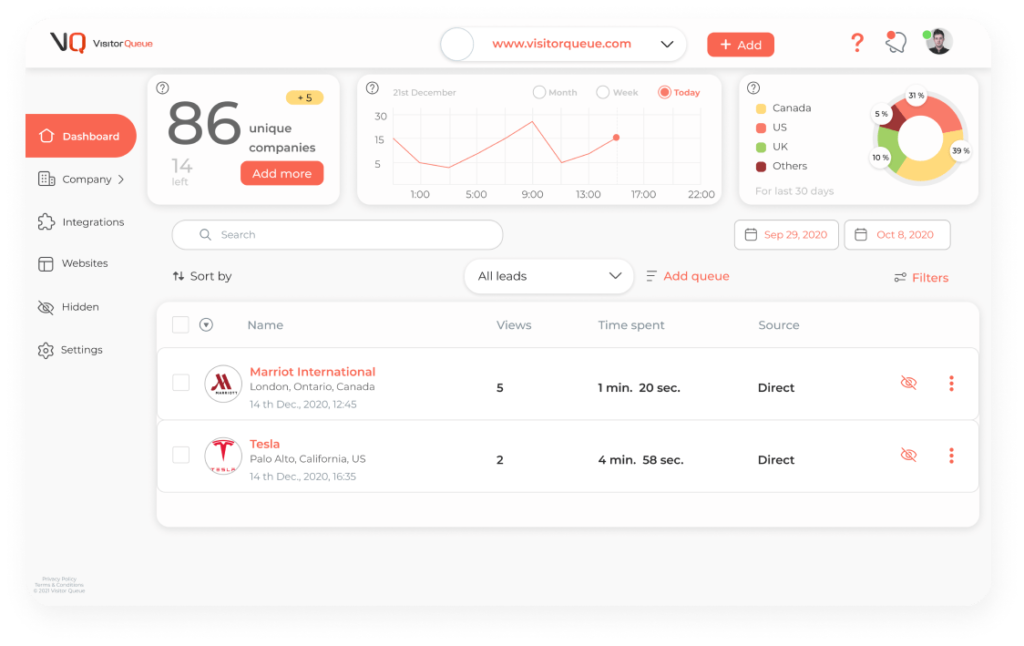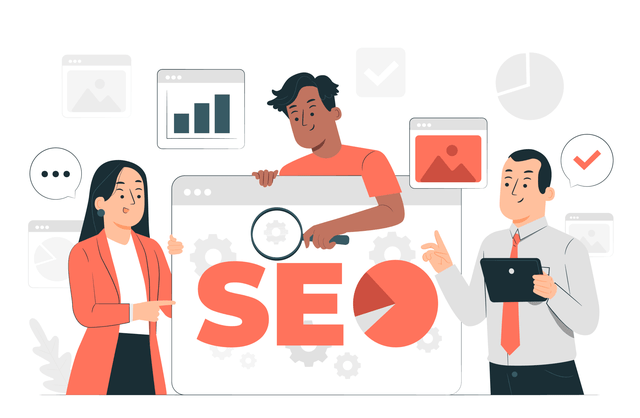Generating high quality leads is often the main focus for B2B companies. In fact, according to a HubSpot report, 50% of marketers consider lead generation to be their first priority in marketing campaigns. While you may be using a variety of marketing tactics to generate leads, SEO remains one of the most effective ways to increase visibility, increase relevant traffic, and ultimately generate high quality leads. In this article, we’re going to go through how SEO impacts B2B lead generation and how to optimize your current SEO strategies. First, let’s go over what SEO even is.
What is SEO?
SEO, or Search Engine Optimization, is the process of improving a website’s visibility on search engine results pages, or SERPs, like Google. The goal is to rank higher for specific keywords or search terms that are relevant to your business, which in turn drives more organic traffic to your website. SEO involves optimizing various parts of your website, from content to technical structure, in a way that aligns with search engine algorithms. Key components of SEO include keyword research, on and off page optimization, technical SEO, and content creation. Now that we’ve defined SEO, let’s dive into how SEO directly impacts B2B lead generation and why it’s so important for your business.

How SEO Impacts B2B Lead Generation & Its Importance
SEO plays a critical role in generating B2B leads for several reasons. The B2B buying process is typically longer and more complex than in B2C. With multiple decision makers involved and a greater need for research. As a result, B2B buyers rely heavily on search engines during their research and decision making phases. Here are a few key reasons why SEO impacts B2B lead generation.
Increased Visibility in Search Results
When potential B2B customers are looking for products or services, their first stop is often a Google search. If your website ranks highly for relevant keywords, you’re more likely to be discovered by potential clients. And, being visible in search results increases your chances of attracting organic traffic from qualified leads who are actively searching for solutions that your business provides. This can make your company stand out from the competition.
Attracting the Right Audience to Your Website
SEO allows you to target specific keywords that your potential clients are searching for. By focusing on the right keywords, you can attract visitors who are genuinely interested in your offerings and are more likely to convert into leads. For example, if you’re offering enterprise software solutions, ranking for terms like “best B2B software for large companies” or “enterprise software providers” ensures that you’re reaching decision makers in your target market. So, it would be smart to create blog articles surrounding these keywords and topics.
Building Credibility and Trust
Appearing at the top of search engine results can enhance your business’s credibility. Users tend to trust websites that rank highly on Google, as they perceive these sites to be authoritative and reliable. High rankings coupled with informative content also signal to search engines that your business is a trusted source of information. As a result, you can build long-term credibility.
Supports the Buyer’s Journey
The B2B buyer journey involves several stages: awareness, consideration, and decision making. SEO can help you create content that addresses each stage of this journey. For example, potential buyers in the awareness stage may be searching for information about how to solve a problem. While those in the consideration stage might look for comparisons between different solutions. Optimizing your content for each stage ensures that you’re meeting your audience’s needs at the right time. In turn, you can increase the likelihood of conversion.
Cost-Effective Lead Generation
Compared to paid search campaigns or traditional advertising, SEO is a cost-effective method for generating B2B leads. While SEO requires investment in time and resources to implement effectively, the organic traffic you attract doesn’t come with the ongoing costs associated with pay-per-click advertising. This makes SEO an attractive long-term strategy for businesses looking to maintain a steady stream of inbound leads. Take a look at our article, SEO vs SEM – Which is Better to learn more about this topic.

SEO Best Practices for B2B Lead Generation
In order to generate leads from SEO, there are a few best practices that you should follow.
Start With Keyword Research
For B2B companies, it’s important to identify keywords that are not only relevant to your industry but also aligned with the search intent of your target audience. Start by creating a list of relevant keywords related to your products or services, and then use tools like Google Keyword Planner, SEMrush, or Ahrefs to assess search volume, competition, and relevance. Focus on both short-tail keywords to capture different stages of the buyer’s journey.
Create and Optimize Landing Pages
When creating landing pages, focus on delivering targeted, relevant content that speaks directly to your audience’s pain points and offers a solution. Optimize your landing pages for your target keywords, and ensure the page contains a clear call to action, such as filling out a form or downloading a resource. Your landing pages will have different goals than blog articles, and need to be optimized as such. Creating and optimizing landing pages is pretty in depth, so if you’re looking to learn more take a look at our article 10 Tips to Optimize Your Landing Pages.
Look at Your Competitors
If you’re not sure what kind of content you should be creating, try taking a look at some of your competitors or industry leaders. This can give you an idea of the quality, length, and tone of voice of their content, and you can use this to make your content even better. However, it’s important to put your own spin on things and produce original content.
Create High-Quality Content
Content is one of the most important factors in SEO. Search engines prioritize websites that offer valuable, relevant, and well-written content. When creating content for your audience, focus on providing solutions to the problems your potential customers are facing. Consider developing blog posts, whitepapers, case studies, eBooks, and other forms of content that not only educate your audience but also position your business as an industry expert. Talk to your sales team or use tools like SEMRush to find out common questions your audience may have.
Optimize for User Experience
Search engines prioritize websites that offer a good user experience. Factors like speed, mobile friendliness, and easy navigation all influence how your website visitors interact with your site, and therefore how search engines rank it. For example, if your website is not optimized and has a high bounce rate, there is a good chance that your site will get bumped down in results.
On-Page SEO
On-page SEO refers to the elements you can control directly on your website. This includes optimizing title tags, meta descriptions, headers, and URLs for your target keywords. When optimizing on-page SEO for lead generation, consider the following:
- Title Tags and Meta Descriptions: Ensure that your title tags and meta descriptions are not only keyword-optimized but also enticing enough to encourage users to click through to your site. It can be helpful to regularly give your content meta data refreshes to ensure they are always relevant.
- Header Tags: Use header tags like H1, H2 and H3 to structure your content and make it easy for both users and search engines to understand the hierarchy of information.
- Internal Linking: Include internal links to other relevant pages on your site. This helps search engines crawl your site more effectively and encourages users to explore additional content.
Build Backlinks
Off-page SEO, particularly link building, is crucial for improving your website’s authority in the eyes of search engines. Backlinks are links from other websites that point to your site, and they serve as a vote of confidence in your content. To generate high-quality backlinks, focus on creating content that others in your industry would find valuable and worthy of sharing. You can also reach out to industry publications, blogs, and influencers to collaborate on guest posts or link exchanges. The more authoritative and relevant the websites linking to your content, the better your rankings will be. If you’re looking to generate more backlinks, try using Moz to track and identify new opportunities.
Leverage Schema Markup
Schema markup is a type of structured data that helps search engines understand the content of your website more clearly. By using schema markup, you can enhance how your pages appear in search results, such as by adding rich snippets, which can display additional information like ratings, prices, or event details directly on the SERPs. Rich snippets can increase your click-through rate (CTR), drive more traffic to your site, and attract higher-quality leads. Common schema types to use for B2B lead generation include products and services, reviews, and FAQs.
Analyze Your Performance
SEO is not a one-and-done task; it requires ongoing monitoring and adjustments. Use tools like Google Analytics, Google Search Console, and SEMRush to track rankings, organic traffic, and conversions. By regularly reviewing key metrics such as organic traffic, bounce rates, and conversion rates, you can identify areas for improvement and refine your strategy over time. For example, if certain keywords are driving traffic but not conversions, you may need to adjust your content to better address the needs of your audience.
Track Your Website Visitors
Increasing your website traffic through SEO strategies is helpful, but it can be limiting not knowing who is visiting your site. That’s where Visitor Queue comes in. With the help of Visitor Queue, you can easily identify the companies that visit your website, along with how they got there, the pages they visited, and how long they spent on each page. This can help you see if your SEO strategies are attracting the right audience. And, with our employee contact information, you can reach out to your visitors to ensure they found what they were looking for. Try Visitor Queue for free today to start identifying your website visitors and stop losing leads.

Implement Retargeting with SEO Insights
Not every visitor to your site will convert on their first visit, but that doesn’t mean they’re lost leads. Retargeting allows you to follow up with visitors who’ve interacted with your site but didn’t convert. By using SEO insights, like which pages are most visited or which content drives the most engagement, you can create personalized retargeting ads. Since it takes multiple touchpoints before a conversion, this is a great way to keep your company top of mind.
Final Words
SEO is a long term investment. It can take months to see the results of your work, but it is one of the best ways to generate leads and create a well rounded strategy for your company. Keep experimenting, testing, and refining your approach to stay ahead of the competition and meet your lead generation goals. Again, it’s crucial that you stay on top of your metrics and algorithm changes to ensure you’re following best practices. If you have any questions about using Visitor Queue to generate leads, do not hesitate to contact us.
 Identify
Identify Personalize
Personalize Benchmark
Benchmark Agencies
Agencies Integrations
Integrations Case Studies
Case Studies Use Cases
Use Cases Blog
Blog Resources
Resources









